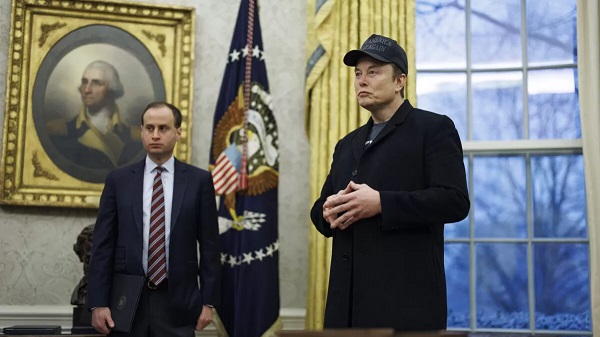Business
Americans Say Government Is Corrupt and Inefficient but Are Lukewarm About DOGE

Democrats seem willing to tolerate a lot to get a larger government, but Republicans aren’t much better
Americans think government is wasteful when it’s not outright fraudulent and abusive. That should create a welcoming environment for the Department of Government Efficiency (DOGE) and its mission to cut fat out of federal agencies on the way to (hopefully) reducing the state and balancing the budget. But support for DOGE is lukewarm. Unsurprisingly in these politically fractured times, cost-cutting efforts are a lot more popular with Republicans than Democrats, but polling suggests the division isn’t just one of partisanship. The DOGE is running up against fundamental disagreements over the role of government and the people who staff it—and the price people are willing to pay for a less-obnoxious government.
Corrupt and Inefficient Government, but Iffy Support for DOGE
Last year, Pew Research polling found that 56 percent of Americans say government is “almost always wasteful and inefficient.” The Babbie Centre at Chapman University reported that “nearly 2/3 of Americans fear that our government is run by corrupt officials.” And last month, A.P.-NORC researchers found 70 percent of Americans believe corruption is a major problem in the federal government, 65 percent say the same of inefficiency, and 59 percent see red tape—including regulations and bureaucracy—as a major problem.
Yet DOGE draws just a 39 percent “favorable” rating in the latest The Economist/YouGov poll, a bare three points ahead of “unfavorable” at 36 percent (25 percent picked “don’t know”). A poll this month from Trafalgar Group found 49 percent approving of the cost-cutting efforts of DOGE and Elon Musk, with 44 percent disapproving (7 percent were undecided). That’s more support than opposition in both cases, but you’d expect greater enthusiasm from a public that overwhelmingly considers government to be corrupt and wasteful (with plenty of evidence to support that position).
Part of the explanation, of course, is partisanship. Anything done by officials from one of the major parties is bound to be booed by the opposition, no matter what. As Gallup’s Jeffrey M. Jones pointed out in 2022, “generally speaking, Republicans and Democrats are more inclined to say the government has too much power when the president is from the other party, and less inclined when a president from their own party is in the White House.” That tribalism likely extends to cutting government as well, even if the cuts apply to agencies controlled for the moment by political enemies. Sure enough, both Trafalgar and The Economist/YouGov found far greater support for DOGE among Republicans than among Democrats (independents split the difference).
Democrats Want More Government, Flaws and All
But there are also real differences in attitudes toward the role of the state. The same Pew poll that reported widespread belief in the wastefulness and inefficiency of government also found that 49 percent of respondents “would prefer a smaller government providing fewer services” while 48 percent “would rather have a bigger government providing more services.” And the partisan divide here isn’t just tribal, it’s ideological. Despite fluctuations depending on who is in power, Republicans have overwhelmingly favored a smaller government providing fewer services since polling on the issue began in 1976 (support for bigger government peaked among them at about one-third in 1988 and 2004). Democratic support for larger, more active government grew from 49 percent in 1976 to 74 percent now.
Democrats in the A.P.-NORC poll were just slightly kinder than Republicans in their opinions on government corruption, efficiency, and red tape; majorities agree the federal government is corrupt and inefficient, while a 47 percent plurality says that red tape is a major problem. Given the overwhelming belief that government is corrupt and wasteful, but iffy support for DOGE, it’s fair to conclude that at least some Democrats are willing to put up with those concerns as the price of a larger state.
Partisan disagreement over the role of government also applies to trust in the people who staff the federal bureaucracy. These are the people the Trump administration offered buyouts and seeks to reduce in number, much like the Clinton administration did in the 1990s. Support for reducing the federal workforce depends, to a large extent, on agreement that those workers are part of the problem—or at least that we’d be better off with fewer of them. That’s not a universal opinion.
“Just 38% of Republicans and Republican-leaning independents express a great deal or a fair amount of confidence in federal career employees,” Pew Research noted last week. That’s down 10 points from 2018. “In contrast, 72% of Democrats and Democratic leaners say they have confidence in career government employees – 7 points higher than in 2022, but on par with 2018 levels.”
So, if we’re to believe what members of the public tell researchers, majorities of Americans across partisan divides think the federal government is corrupt and inefficient. But a fair number of those who hold this position—Democrats, in particular—are confident that the people employed by the federal government aren’t responsible for that corruption and efficiency. Those problems appear from somewhere, perhaps as a miasma emanating from the swamp that D.C. was in years past. Also, many of those concerned that corruption and inefficiency plague the government are willing to put up with those handicaps so that the corrupt and inefficient government can play a larger role in our lives.
Republicans Also Want Their Expensive Goodies
Of course, consistency and logic aren’t necessarily common features of public opinion. As I’ve noted before, Republicans and Democrats may disagree when it comes to broad philosophical statements about the size and role of government, but when it comes to specifics, there’s more that unites them than divides them. Majorities of partisans of both parties as well as of independents want more federal spending on Social Security, Education, and Medicare, according to A.P.-NORC. A majority of Democrats also want more to be spent on Medicaid and assistance to the poor, while a majority of Republicans similarly want more dedicated to border security and the military.
Social Security is almost a quarter of federal spending all by itself, while Medicare, Medicaid, and other health care are slightly more, by the Cato Institute’s reckoning. National defense is about 13 percent, as is income security, with interest on federal debt right behind. DOGE faces quite an uphill battle to succeed in its mission to slash the size and cost of federal government.
DOGE faces obstacles from Democrats who recognize that the government is corrupt and inefficient but want more of it anyway. It also faces a challenge in Republicans and independents who say they want less government but don’t want to surrender their favorite boondoggles.
Americans are lukewarm about DOGE because they’re torn about its mission. Sure, they have a low opinion of the federal government, but they might be willing to put up with its deep flaws so long as it delivers their goodies.
|
|
|
Business
US Energy Secretary says price of energy determined by politicians and policies


From the Daily Caller News Foundation
During the latest marathon cabinet meeting on Dec. 2, Energy Secretary Chris Wright made news when he told President Donald Trump that “The biggest determinant of the price of energy is politicians, political leaders, and polices — that’s what drives energy prices.”
He’s right about that, and it is why the back-and-forth struggle over federal energy and climate policy plays such a key role in America’s economy and society. Just 10 months into this second Trump presidency, the administration’s policies are already having a profound impact, both at home and abroad.
While the rapid expansion of AI datacenters over the past year is currently being blamed by many for driving up electric costs, power bills were skyrocketing long before that big tech boom began, driven in large part by the policies of the Obama and Biden administration designed to regulate and subsidize an energy transition into reality. As I’ve pointed out here in the past, driving up the costs of all forms of energy to encourage conservation is a central objective of the climate alarm-driven transition, and that part of the green agenda has been highly effective.
Dear Readers:
As a nonprofit, we are dependent on the generosity of our readers.
Please consider making a small donation of any amount here.
Thank you!
President Trump, Wright, and other key appointees like Interior Secretary Doug Burgum and EPA Administrator Lee Zeldin have moved aggressively throughout 2025 to repeal much of that onerous regulatory agenda. The GOP congressional majorities succeeded in phasing out Biden’s costly green energy subsidies as part of the One Big Beautiful Bill Act, which Trump signed into law on July 4. As the federal regulatory structure eases and subsidy costs diminish, it is reasonable to expect a gradual easing of electricity and other energy prices.
This year’s fading out of public fear over climate change and its attendant fright narrative spells bad news for the climate alarm movement. The resulting cracks in the green facade have manifested rapidly in recent weeks.
Climate-focused conflict groups that rely on public fears to drive donations have fallen on hard times. According to a report in the New York Times, the Sierra Club has lost 60 percent of the membership it reported in 2019 and the group’s management team has fallen into infighting over elements of the group’s agenda. Greenpeace is struggling just to stay afloat after losing a huge court judgment for defaming pipeline company Energy Transfer during its efforts to stop the building of the Dakota Access Pipeline.
350.org, an advocacy group founded by Bill McKibben, shut down its U.S. operations in November amid funding woes that had forced planned 25 percent budget cuts for 2025 and 2026. Employees at EDF voted to form their own union after the group went through several rounds of budget cuts and layoffs in recent months.
The fading of climate fears in turn caused the ESG management and investing fad to also fall out of favor, leading to a flood of companies backtracking on green investments and climate commitments. The Net Zero Banking Alliance disbanded after most of America’s big banks – Goldman Sachs, J.P. Morgan Chase, Citigroup, Wells Fargo and others – chose to drop out of its membership.
The EV industry is also struggling. As the Trump White House moves to repeal Biden-era auto mileage requirements, Ford Motor Company is preparing to shut down production of its vaunted F-150 Lightning electric pickup, and Stellantis cancelled plans to roll out a full-size EV truck of its own. Overall EV sales in the U.S. collapsed in October and November following the repeal of the $7,500 per car IRA subsidy effective Sept 30.
The administration’s policy actions have already ended any new leasing for costly and unneeded offshore wind projects in federal waters and have forced the suspension or abandonment of several projects that were already moving ahead. Capital has continued to flow into the solar industry, but even that industry’s ability to expand seems likely to fade once the federal subsidies are fully repealed at the end of 2027.
Truly, public policy matters where energy is concerned. It drives corporate strategies, capital investments, resource development and movement, and ultimately influences the cost of energy in all its forms and products. The speed at which Trump and his key appointees have driven this principle home since Jan. 20 has been truly stunning.
David Blackmon is an energy writer and consultant based in Texas. He spent 40 years in the oil and gas business, where he specialized in public policy and communications.
Business
Oil tanker traffic surges but spills stay at zero after Trans Mountain Expansion

From the Canadian Energy Centre
Bigger project maintains decades-long marine safety record
The Trans Mountain system continues its decades-long record of zero marine spills, even as oil tanker traffic has surged more than 800 per cent since the pipeline’s expansion in May 2024.
The number of tankers calling at Trans Mountain’s Westridge Marine Terminal in the Port of Vancouver in one month now rivals the number that used to go through in one year.
A global trend toward safer tanker operations
Trans Mountain’s safe operations are part of a worldwide trend. Global oil tanker traffic is up, yet spills are down, according to the International Tanker Owners Pollution Federation, a London, UK-based nonprofit that provides data and response support.
Transport Canada reports a 95 per cent drop in ship-source oil spills and spill volumes since the 1970s, driven by stronger ship design, improved response and better regulations.
“Tankers are now designed much more safely. They are double-hulled and compartmentalized to mitigate spills,” said Mike Lowry, spokesperson for the Western Canada Marine Response Corporation (WCMRC).
WCMRC: Ready to protect the West Coast

One of WCMRC’s new response vessels arrives in Barkley Sound. Photo courtesy Western Canada Marine Response Corporation
From eight marine bases including Vancouver and Prince Rupert, WCMRC stands at the ready to protect all 27,000 kilometres of Canada’s western coastline.
Lowry sees the corporation as similar to firefighters — training to respond to an event they hope they never have to see.
In September, it conducted a large-scale training exercise for a worst-case spill scenario. This included the KJ Gardner — Canada’s largest spill response vessel and a part of WCMRC’s fleet since 2024.
“It’s part of the work we do to make sure everybody is trained and prepared to use our assets just in case,” Lowry said.
Expanding capacity for Trans Mountain

The K.J. Gardner is the largest-ever spill response vessel in Canada. Photo courtesy Western Canada Marine Response Corporation
WCMRC’s fleet and capabilities were doubled with a $170-million expansion to support the Trans Mountain project.
Between 2012 and 2024, the company grew from 13 people and $12 million in assets to more than 200 people and $213 million in assets.
“About 80 per cent of our employees are mariners who work as deckhands, captains and marine engineers on our vessels,” Lowry said.
“Most of the incidents we respond to are small marine diesel spills — the last one was a fuel leak from a forest logging vessel near Nanaimo — so we have deployed our fleet in other ways.”
Tanker safety starts with strong rules and local expertise

Tanker loading at the Westridge Marine Terminal in the Port of Vancouver. Photo courtesy Trans Mountain Corporation
Speaking on the ARC Energy Ideas podcast, Trans Mountain CEO Mark Maki said tanker safety starts with strong regulations, including the use of local pilots to guide vessels into the harbour.
“On the Mississippi River, you have Mississippi River pilots because they know how the river behaves. Same thing would apply here in Vancouver Harbour. Tides are strong, so people who are familiar with the harbor and have years and decades of experience are making sure the ships go in and out safely,” Maki said.
“A high standard is applied to any ship that calls, and our facility has to meet very strict requirements. And we have rejected ships, just said, ‘Nope, that one doesn’t fit the bill.’ A ship calling on our facilities is very, very carefully looked at.”
Working with communities to protect sensitive areas
Beyond escorting ships and preparing for spills, WCMRC partners with coastal communities to map sensitive areas that need rapid protection including salmon streams, clam beds and culturally important sites like burial grounds.
“We want to empower communities and nations to be more prepared and involved,” Lowry said.
“They can help us identify and protect the areas that they value or view as sensitive by working with our mapping people to identify those areas in advance. If we know where those are ahead of time, we can develop a protection strategy for them.”
-

 Business2 days ago
Business2 days agoCanada’s climate agenda hit business hard but barely cut emissions
-

 Bruce Dowbiggin1 day ago
Bruce Dowbiggin1 day agoIntegration Or Indignation: Whose Strategy Worked Best Against Trump?
-

 Artificial Intelligence2 days ago
Artificial Intelligence2 days agoAI is accelerating the porn crisis as kids create, consume explicit deepfake images of classmates
-

 Business1 day ago
Business1 day agoCarney’s Toronto cabinet meetings cost $530,000
-

 Censorship Industrial Complex2 days ago
Censorship Industrial Complex2 days agoConservative MP Leslyn Lewis slams Liberal plan targeting religious exemption in hate speech bil
-

 Health2 days ago
Health2 days ago23,000+ Canadians died waiting for health care in one year as Liberals pushed euthanasia
-

 MAiD1 day ago
MAiD1 day ago101-year-old woman chooses assisted suicide — press treats her death as a social good
-

 espionage1 day ago
espionage1 day agoDigital messages reportedly allege Chinese police targeted dissident who died suspiciously near Vancouver













